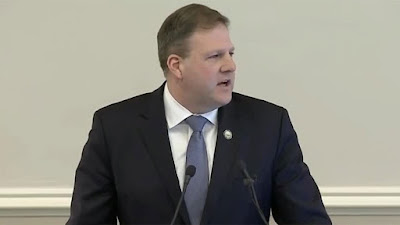The House of Representatives has joined the Senate in voting to repeal the death penalty in New Hampshire, but not by the margin needed to override an anticipated veto by Gov. Chris Sununu.
The 223-to-116 vote on Thursday came after a debate in which representatives restated many of the arguments made in hearings before House and Senate committees.
The state Senate voted 14-10 on March 16 to pass the death penalty repeal bill, SB 593.
Much of the debate has centered on whether such a move would affect the planned execution of the only convict on death row in the state.
The House has voted in the past to repeal the death penalty in New Hampshire, the only New England state with capital punishment still on the books. The Senate deadlocked on the issue 12-12 in 2016 and 2014.
Gov. Chris Sununu has already said he supports the current death penalty law and will veto the repeal effort if it gets to his desk. A two-thirds majority will be needed to override the veto.
The Senate was two votes short of the 16 votes needed to override.
The House will need around 255 votes to override a Sununu veto, depending on how many representatives are present when the vote is taken.
The state's death penalty has not been used since 1939, and no one was on death row for decades until Michael Addison was convicted in the murder of Manchester police officer Michael Briggs in 2008.
The prospect of Addison's sentence being reduced to life in prison without the possibility of parole dominated much of the debate, with opponents of repeal calling for justice on behalf of the officer's surviving family.
The bill states that repeal can only be applied moving forward, suggesting that Addison's death sentence remains in place even if the bill passes.
But opponents of repeal cited an advisory memo from Attorney General Gordon MacDonald, who said Addison's sentence would “probably not” remain in place if the death penalty is repealed.
MacDonald cited court rulings in other states where the death penalty has been repealed, and noted that no convict on death row has ever been executed in a state once it repeals the death penalty.
Source: Union Leader, April 26, 2018
It's Time to End New Hampshire's Death Penalty
New Hampshire is the only state in New England that still has the death penalty. That has to change. This archaic practice defies New Hampshire values and defies justice. The state has come close to repealing capital punishment in the past only to fall short.
There is now a renewed push to end this barbaric punishment in the current legislative session. A bill in the State Senate (SB593), which would replace capital punishment with life in prison without parole for convictions after January 2019, has broad support. It was approved by a 14-to-10 vote in the state Senate in March, and sailed through the New Hampshire House with a vote today of 223 to 116.
The bill now heads to the desk of Gov. Chris Sununu, who has threatened to veto it. Though he has stated his support for the death penalty, he would not be the first to change his views. Views among legislators on the death penalty have evolved in recent years, and the state Senate vote is a prime example. Many who supported the repeal bill this year had previously voted against repeal. They shifted because the best way to ensure that New Hampshire does not execute an innocent person is to repeal the death penalty. As one witness said at the House hearing on the repeal bill: "It is either dangerously arrogant or incredibly naive to believe that New Hampshire's criminal justice system is infallible."
The witness was Barbara Keshen, who now heads the New Hampshire Coalition to Abolish the Death Penalty. Several years ago, Keshen, who was a public defender, had been assigned to represent Richard Buchanan, who was charged with raping and murdering his girlfriend's young daughter, Elizabeth Knapp. All the evidence seemed to indicate that Buchanan committed the crime. The state Attorney General reassured people in the neighborhood that they need not be in fear as they had the guy who did it. Keshen has said even she believed her client was guilty. The prosecutor said he was going for the death penalty.
But for the DNA contained in a condom that was later found, tying the crime to a next-door neighbor, Buchanan would have almost certainly been wrongfully convicted and wrongfully sentenced to death. The case against Buchanan was such a slam-dunk that when the DNA evidence from the condom first came back, even Keshen said she did not believe it.
Some hold this case up as proof that wrongful convictions do not happen in New Hampshire. But the opposite is true. The Buchanan case shows the fallibility of the system and the potential for wrongful convictions in New Hampshire. If DNA evidence had not been discovered in the Buchanan case, the outcome could have been devastatingly wrong. It's chilling to think that a life depended on finding a single exculpatory piece of evidence.
So long as the death penalty stays on the books, there is a risk of a wrongful capital conviction. Yet supporters of capital punishment in the state House insist that it should remain as a form of "deterrence." That argument suffers from the same false logic of the "get tough on crime" philosophy that has driven criminal justice policy for decades. That philosophy has not made us safer; instead, it has led to mass incarceration and permanently subjected people with criminal records to 2nd-class status.
The same goes for the death penalty. It does not act as a deterrent. People who commit capital crimes do not stop to weigh prison time versus death row. If the death penalty were a deterrent, states that repeal the death penalty would see spikes in their murder rate, but they don't. In fact, states that do not have the death penalty have lower murder rates than states that still have it. On a national level, the United States has a per capita murder rate significantly higher than European nations, which abolished the death penalty years ago.
New Hampshire lawmakers have shown that the state is ready for abolition of this savage penalty. The only question is whether Gov. Sununu will defy the Legislature and demand that New Hampshire keep this ineffective, inhumane, and regressive practice on the books.
Source: ACLU, Jeanne Hruska, Policy Director, ACLU of New Hampshire, April 27, 2018
⚑ | Report an error, an omission, a typo; suggest a story or a new angle to an existing story; submit a piece, a comment; recommend a resource; contact the webmaster, contact us:
deathpenaltynews@gmail.com.
Opposed to Capital Punishment? Help us keep this blog up and running! DONATE!
"One is absolutely sickened, not by the crimes that the wicked have committed,
but by the punishments that the good have inflicted." -- Oscar Wilde













